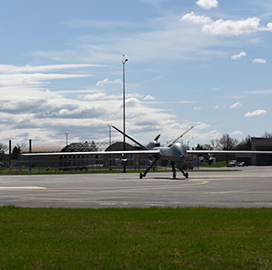Derek Tournear, director of the Space Development Agency (SDA) and 2021 Wash100 Award recipient, said SDA is prioritizing the on-time delivery of systems that will form a new satellite constellation intended to support military targeting and missile tracking work in terrestrial missions, DOD News reported Friday.
He said at a recent Space Force Association event the agency seeks to provide warfighters a pair of capabilities to detect targets beyond line of sight and track adversarial missiles in flight through the National Defense Space Architecture.
Tournear noted that SDA will work with the Missile Defense Agency, the Air Force Research Laboratory and the Defense Advanced Research Projects Agency to deploy five satellites this year as part of NDSA demonstration efforts.
Lockheed Martin and York Space Systems won contracts in August 2020 to build Transport Layer Tranche 0 space vehicles. A month later, L3Harris Technologies and SpaceX were awarded the Tracking Layer Tranche 0 contracts.
The SDA director expects both NDSA elements to be deployed in September 2022.




 To
To 



